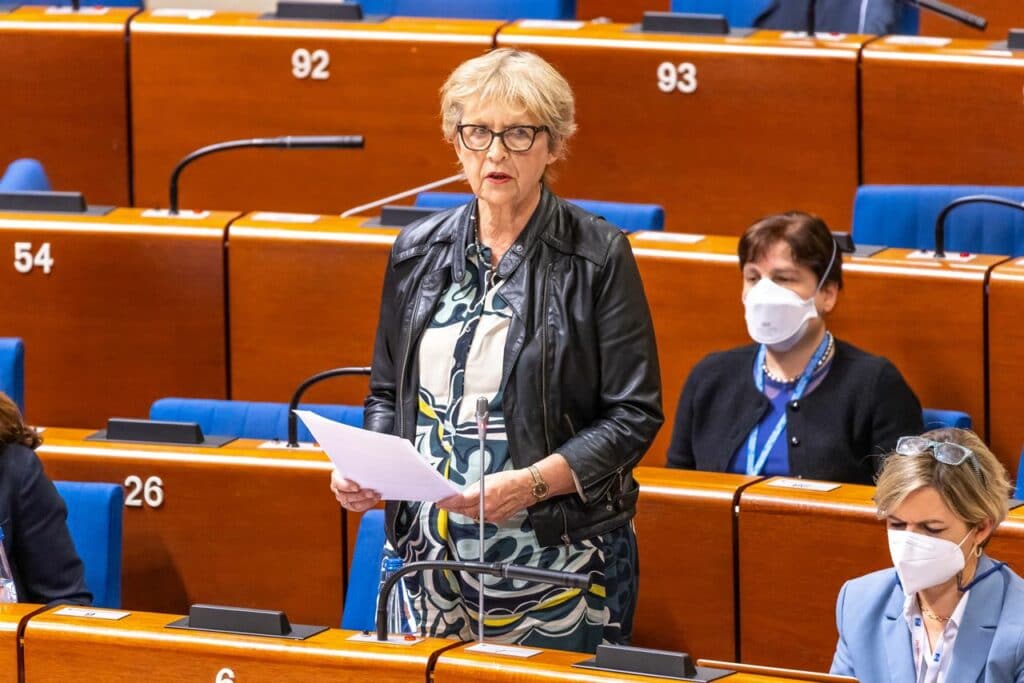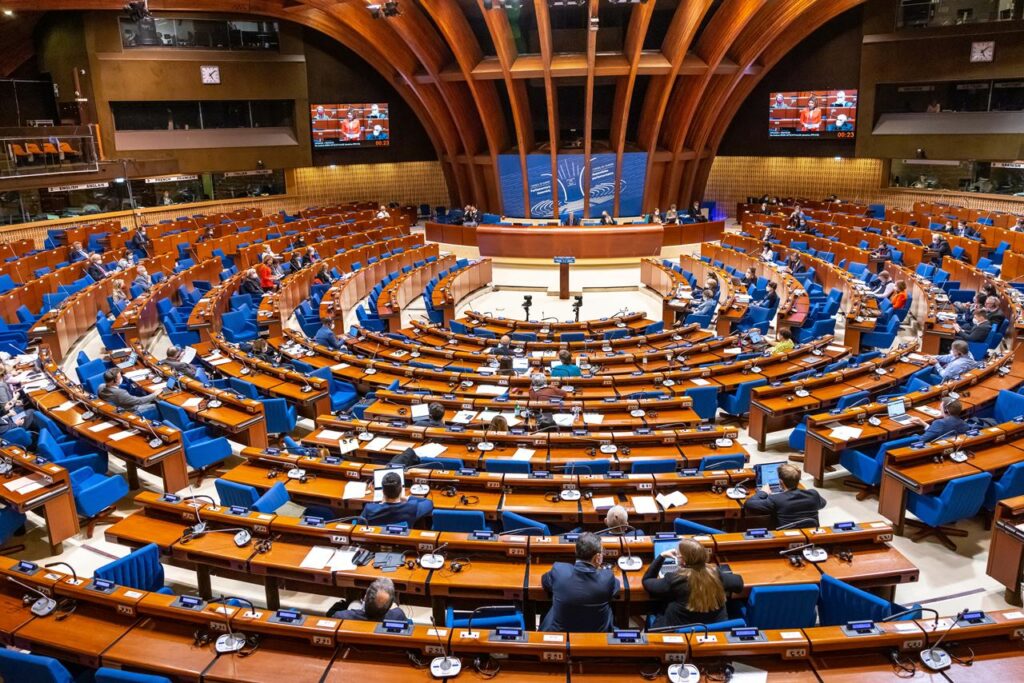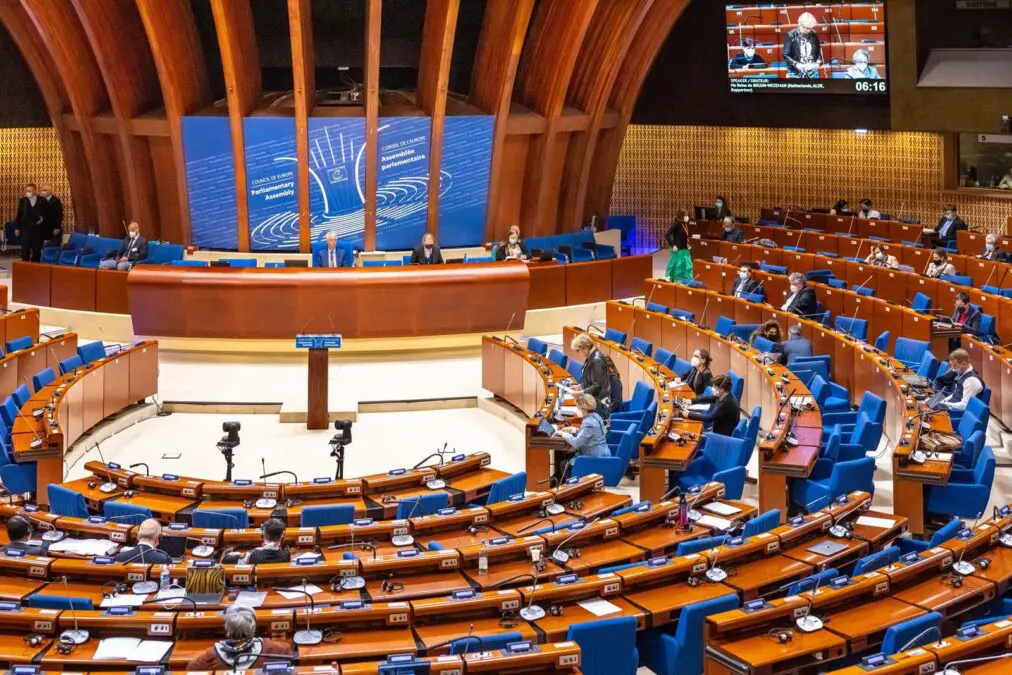The Parliamentary Assembly of the Council of Europe adopted a Recommendation and a Resolution on the deinstitutionalisation of persons with disabilities. Both of these provide important guidelines in the process of implementing human rights in this field for the years to come.
Both the Recommendation and the Resolution were approved with a very large majority vote during the Assembly’s Spring session at the end of April. Every political group as did all speakers during the debate supported the report and its recommendations thus solidly confirming the rights of persons with disability as part of the European agenda.
Ms Reina de Bruijn-Wezeman, from the Assembly’s Social Affairs, Health and Sustainable Development Committee had led the Assembly’s investigation in to the issue lasting nearly two years. She now presented her findings and recommendations to the plenary Assembly, following a unanimous approval in the committee.
She told the Assembly, that “Persons with disabilities have the same human rights as you and me. They have the right to live independently and receive appropriate community-based services. This applies no matter how intensive support is needed.”
She added that “Deinstitutionalisation, in my opinion, is a key stepping stone to ending coercion in mental health. The right of persons with disabilities to equality and inclusion are now recognized at the international level in particularly thanks to the UN Convention of the Rights of Persons with Disabilities, the CRPD, adopted in 2006.”
Ms Reina de Bruijn-Wezeman, as a last point in her presentation stated “I call on Parliament to take the necessary steps to progressively repeal legislation authorizing institutionalisation of persons with disabilities, as well as mental health legislation allowing treatment without consent and not to support or endorse draft legal texts which would make successful and meaningful deinstitutionalisation more difficult and which go against the spirit of the letter of the CRPD.”
Committee Opinion
As part of the regular procedures of the Parliamentary Assembly a so-called Opinion on the report from another Parliamentary Committee was presented. Ms Liliana Tanguy from the Committee on Equality and Non-Discrimination presented the Committee’s Opinion. She noted, that “the assembly has repeatedly confirmed its support for the full respect of the rights of persons with disabilities.” She congratulated Ms. Bruijn-Wezeman on her report, which she stated clearly highlights why deinstitutionalisation of people with disabilities must be an integral part of this approach.
She added that she as well “want to congratulate the rapporteur because her report goes beyond mere policy positions. It draws attention to the concrete measures that States can and should take in order to ensure a relevant, effective and sustainable deinstitutionalisation process, fully respecting the rights of people with disabilities as well as the sources of funding to achieve this.”
Placed in an institution is placed at risk

Ms Reina de Bruijn-Wezeman in the presentation of her report had pointed out that “placement on institutions affects the lives of more than a million European citizens and is a pervasive violation of the rights as laid down in Article 19 of the CRPD, which calls to a firm commitment to deinstitutionalisation.”
This has to be seen in the view that persons with disabilities are some of the most vulnerable individuals in our society. And that being placed in institutions “puts them at risk of systemic and individual human rights violations, and many experience physical, mental and sexual violence,” she told the Assembly.
That it isn’t empty words was firmly confirmed when Mr Thomas Pringle from Ireland, who spoke on behalf of the Unified European Left Group, chose to give some examples from Ireland and even his own constituency, were sexual abuse of residents of a centre had come to light. He told the parliamentarians from all of Europe that there has been a long history of abuses in Ireland being exposed over the last ten years or more, with the government having to apologize to citizens on a regular basis.
“It was only a matter of time before apologies will have to be made to people with disabilities for the neglect and abuse that they have received while being accommodated by the state,” Mr Thomas Pringle added.
Ms Beatrice Fresko-Rolfo, speaking on behalf of the Alliance of Liberals and Democrats for Europe (ALDE) group noted that people with disabilities and their families often experience a confusion in the institutional system at the expense of their most basic rights. “Most of the time, they are placed in institutions when they could very well flourish outside them,” she pointed out.
She told the Assembly that she personally “share all the arguments about the benefits that would result from deinstitutionalisation, both for the state, for the people concerned and for our societal models.” She added that “In short, a new health policy that would rely on an increase in human and financial resources for care in the city.”
The most vulnerable and challenged citizens
Mr Joseph O’Reilly speaking on behalf of the Group of the European People’s Party and Christian Democrats stressed, that “The true measure of a civilized society is how it responds to its most vulnerable and challenged citizens.” And he spelled it out, when he said, “For too long, our response to persons with disability has been institutionalisation, a throwing away of the keys and grossly inadequate care, if not abuse. We must deinstitutionalise persons with psychiatric disorders. Psychiatric treatment is and has been the Cinderella of medicine.”
Mr Constantinos Efstathiou from Cyprus further commented on the need to take care of the vulnerable, “For years Institutionalisation proved to be the excuse for not assuming our responsibility, a special responsibility and duty to care for the vulnerable.” He added, that “The practice of confining and forgetting is no longer acceptable. Our co-citizens who happen to be vulnerable must be supported and free to exercise their human rights as a matter of principle, no matter the cost or effort.”
Ms Heike Engelhardt from Germany noted, that “Our society as a whole is called upon to provide inclusive forms of housing in which the old and the young live together, in which people without handicaps and people with assistance needs live together as neighbours. Such forms of living bring us closer to this goal.”
“It is important and right that mental health has its place here in the Council of Europe,” she added. “We must make sure that our recommendations respect the UN Disability Rights Convention of 2006. The Convention understands that human rights apply to everyone. They are not divisible. People with disabilities must be able to make their own decisions as active members of society. We are here today to move a little closer to this goal.”
Deinstitutionalisation required

Ms Margreet de Boer, from the Netherlands noted, “The move towards deinstitutionalisation of persons with disabilities is both strongly needed and required by states human rights obligations where placement in institutions should be abandoned. It’s still being used far too often in all sorts of care, both for people with physical disabilities and people with psychiatric problems.”
“The ultimate goal of deinstitutionalisation is to enable people with disabilities to live ordinary lives in ordinary places, to live independently in their community on an equal basis with others,” Ms Fiona O’Loughlin from Ireland noted.
She then raised the rhetoric question “What do we need to do to achieve that?” Which she answered with the statement: “We need a comprehensive rollout of disability awareness training in line with the human rights model of disability. Only then can we begin to confront unconscious bias and view and value people with disabilities for who they are as citizens of society, capable of contributing to society and living independently.”
And awareness raising is needed. Mr Antón Gómez-Reino from Spain expressed the belief, that “we are living in a difficult time for equality, there are many dark forces also in our democracies, they put prejudices discourses on the table. And that is precisely why we also have to strengthen our commitment to those people with disabilities.”
In alignment with other speakers, he expressed, “It is not acceptable that the response to our citizens with disabilities is confinement without alternative, its oblivion, and it’s the violation and absence of rights.” He pointed out that, “We must go beyond simple, pathologizing and segregating visions that some still defend, and those models that solve only and exclusively with deprivation of liberty. These situations require greater sensitivity and, above all, greater commitment from legislators and the public.”
Long-term strategy
Ms Reina de Bruijn-Wezeman in her presentation had made it clear that a key challenge is to ensure that the process of institutionalisation itself is carried out in a way that is human rights compliant.
The process of deinstitutionalisation, she explained, “requires a long-term strategy that ensures that good quality care is available in community settings. As institutionalised persons are being reintegrated into society, there is a need for a comprehensive social service and individualised support in the deinstitutionalisation process in order to support these persons and in many cases their families or other carers. Such support must be accompanied by specific access to services outside institutions enabling people to obtain care, work, social assistance, housing, etc.”
She warned that “if the process of deinstitutionalisation is not managed properly and without due consideration to special needs of each person concerned, this can have unfortunate consequences.”
Mr Pavlo Sushko from Ukraine confirmed this would be necessary, based on experience from his country. He noted, that “A lot of European countries have deinstitutionalisation strategies or have at least adopted measures in a broader disability strategy.” But also, that these have to be done based on the existing conditions of that particular country.
He said that “Each country has its own tempo and progress in this reform.” A viewpoint that was shared by other speakers.
Sharing experiences
Several speakers mentioned the scene of their countries both the good and the bad. Standing out was the good examples from Sweden mentioned by Ms Ann-Britt Åsebol. She pointed out that people with disabilities have the right to their own housing in Sweden and to the support needed to be able to live an independent life. Other examples were mentioned from Azerbaijan and even Mexico.
Ms Reina de Bruijn-Wezeman told The European Times that she was happy with the sharing of national experiences as part of the deinstitutionalisation process in different countries that had been indicated by Assembly speakers.
In concluding the debate Ms Reina de Bruijn-Wezeman gave a comment related to a financial concern of some policymakers in regards to persons with complex disabilities. She said, that “Institutionalised care is paying a lot of money for a poorer outcome in terms of quality of life.” She however also confirmed that it’s true that deinstitutionalisation is costly during the transition period when the institutions are still running and community care is starting out. But this is only during this transition time which she estimated to be 5 to 10 years.
Ms Reina de Bruijn-Wezeman in reflecting on the debate told The European Times that she appreciated the broad support of her report and the Resolution and Recommendation. She however also did note that there were some “buts”. She referred among others to the statement of Mr Pierre-Alain Fridez from Switzerland, who while fully supporting the objectives of the report had expressed a “but”. He believed that for some cases, institutionalisation unfortunately is the only solution for many reasons. He pointed to such instances as a very high level of drug dependence and the exhaustion of family caregivers.
The right to choose and to dignity
In a concluding speech the Chair of the Social Affairs, Health and Sustainable Development Committee, Ms Selin Sayek Böke, reiterated that “each and every individual has the right to choose how they wish to live, with whom they live, where they live, and how they conduct their daily experiences. Each and every individual has the right to dignity. And as such, all our policies actually have to seek that we protect and guarantee that dignity, the right to a dignified life. And this is the guiding principle in the paradigm shift that the UN has put forward with the Convention on the Rights of Persons with Disabilities.”
She pointed to the fact that Article 19 of the convention clearly states our duty to recognize the equal rights of people with disabilities and to ensure full inclusion and participation in the community by: One, ensuring free choice of living conditions; Two, ensuring access to that choice, which means we need the financial and economic resources to do so. Three, by ensuring a comprehensive and holistic framework of provision of public services through those financial means, ranging from access to health, education, employment in short, access to life not only for the disabled, but for their families as well, so that we truly build up a community-based service.
She added “We need to make sure we build that community-based system through a systemic strategy, through well-placed economic policy, through a holistic framework, through monitoring where we make sure it’s actually happens.”
Mr Éctor Jaime Ramírez Barba, an observer to the Council of Europe Parliamentary Assemble for the Mexican Pan party stated that “in Mexico, I believe that we should follow the recommendation given in this report, which I hope this Assembly will approve.”







